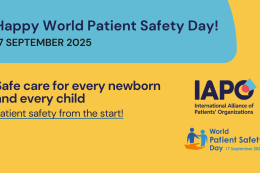Blogging for the British Medical Journal

The patient-centred approach of the Hillsborough inquest
Kawaldip Sehmi wrote about the patient-centred approach of the Hillsborough inquest:
Suddenly I realised that patient-centric post-mortems and inquests led by culturally sensitive coroners were just as important in restoring a deceased patient’s dignity and giving closure to the bereaved, as is patient centric healthcare when they were alive.
We need investment in patient centric coroner’s services. A patient should have their rights respected even when dead. There is a great need to train medical personnel who conduct post-mortems on how to write about the cause of death, injuries, and any adverse pathology related to the death, sensitively and in a personal way.
Read the rest of the article here.
Drug regulation—a patient’s view
Matthias Wienold, IAPO Treasurer, wrote about drug regulation from a patient’s view:
The EMA’s representative asked us what we wanted to achieve. Our answer was simple: “We want to be involved in every decision you take.” And in addition to this plain request, we had a more detailed agenda.
Our strong points were simple, but even today they hold true. (1) Nobody knows more about the needs of patients than the patients themselves. (2) The qualitative reporting from organised patients is often ahead of formal reports. (3) There is no use in approval if patients won’t take the drug. (4) All structured information about experimental use and safety of compounds needs to be taken into account. (5) “This is not the last time you meet with patients.
Read the rest of the article here.
Patient engagement in innovation for health
Kawaldip also published a post relating to the 7th Global Patients Congress, and how patient engagement plays a crucial role in innovation:
It is now a question of having systems of UHC that are for patients, by patients, and with patients, and a whole of society and whole of government partnership between patients, and the public and private sectors.
The sustainability of existing UHC systems is increasingly under question, with the growing perception that these old systems are no longer sustainable. They require innovative solutions to improve their effectiveness, efficiency, quality, and safety, and to generally stabilise them.
Read the rest of the article here.



